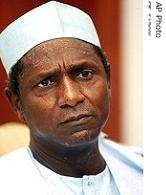2007年VOA标准英语-Analysts Back Nigerian Government's Suspension
搜索关注在线英语听力室公众号:tingroom,领取免费英语资料大礼包。
(单词翻译)
By Kari BarberDakar
26 August 2007
Analysts1 in Nigeria are applauding the government for halting a plan by the Central Bank to change the nation's currency, the naira. On Saturday, Nigerian President Umaru Yar'Adua said the Central Bank's governor had no right to announce the change without the president's prior approval. Kari Barber reports from VOA's West Africa bureau in Dakar that some say the government's move to scrap2 the plan may be a sign it is more committed to due process of law.
 |
| President Umaru Yar'Adua (file photo) |
On Saturday, Nigeria's president, in a statement, confirmed that the re-denomination plan is being scrapped5. Minister of Justice Michael Aondoakaa first announced the government's decision on Friday, saying President Yar'Adua had not approved it.
Lagos-based economist6 Ayo Teriba says the Central Bank did not allow sufficient public discussion before announcing its decision earlier this month. Teriba says the Central Bank acted rashly, making Nigeria appear unstable7.
"The Central Bank's announcement created the impression that Nigeria was unable to control its own Central Bank. So the President's order has eliminated that impression," said Teriba.
Critics of the currency change say it is a waste of resources since the government recently spent millions of dollars printing new naira that would have become obsolete8.
Social activist9 Otive Igbuzor of Action Aid Nigeria says he sees the plan as costly10, with few benefits.
"The re-denomination is not going to put more food on the table, it is not going to increase production. It is not going to decrease poverty," said Otive Igbuzor.
Igbuzor says Mr. Yar'Adua's move to reign11 in the bank could mean the country is moving toward an era of more transparent12 leadership and law-abiding behavior.
"I think what this will do is, it will make the bank be more conscious of what it does and follow due process which is good for the system, it is good for the institution," added Igbuzor.
Central Bank officials have said the plan, which was to take effect next August, would enhance confidence in the currency, help control inflation, and make exchange with other currencies easier. They say they did consult with Mr. Yar'Adua before announcing the new policy. But Minister of Justice Aondoakaa says the Central Bank, by law, has to get approval in writing from the president before changes are made.
Nigeria has one of the largest economies in sub-Saharan Africa. Much of its revenue comes from its oil industry in the violence-plagued Niger Delta13.
 收听单词发音
收听单词发音 




